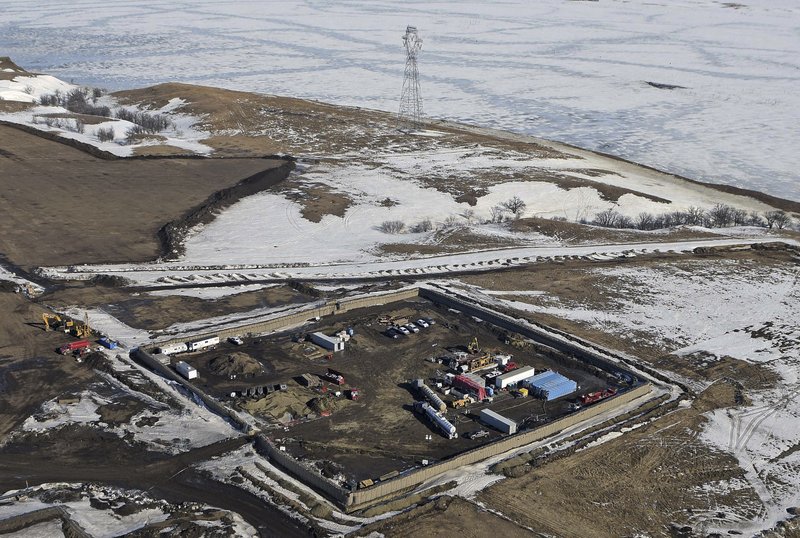4:30 P.M. UPDATE:
Police are arresting Dakota Access pipeline protesters who've failed to meet a deadline to clear a camp on federal land in North Dakota.
The Army Corps of Engineers ordered all protesters to leave by 2 p.m. Wednesday, citing concerns about potential spring flooding. About 150 people met that demand about 1 p.m. when they marched out of the camp.
Hundreds of law enforcement officers from several states were on hand to handle any arrests.
Some protesters set fire to wooden structures Wednesday morning as a part of a ceremony of leaving.
The pipeline will carry North Dakota oil through the Dakotas and Iowa to a shipping point in Illinois. Opponents say it threatens the environment and Native American sacred sites. Dallas-based developer Energy Transfer Partners disputes those claims.
Read Thursday's Arkansas Democrat-Gazette for full details.
EARLIER:
CANNON BALL, N.D. — The last people remaining at a Dakota Access pipeline protest camp prayed and set fire to a handful of wooden structures Wednesday, hours ahead of a deadline set by the Army Corps of Engineers to close the camp.
Some of the praying protesters said burning the structures — which appeared to include a yurt and a teepee — was part of the ceremony of leaving. As heavy rain turned to snow, some said they expected no trouble during the eviction, despite a heavy law enforcement presence.
"People are being very mindful, trying very hard to stay in prayer, to stay positive," said Nestor Silva, 37, of California. "I am not aware of any plans for belligerence."
The Corps has set a 2 p.m. deadline for the camp to be emptied ahead of potential spring flooding. A large cleanup effort has been underway for weeks, first by protesters themselves and now with the Corps set to join in removing debris left over several months.
Wednesday's deadline for the protesters to leave also may not spell the end of the heavy law enforcement presence near where Dallas-based Energy Transfer Partners is finishing the last section of the pipeline, which will carry oil from North Dakota through the Dakotas and Iowa to a shipping point in Illinois.
The protest camp is on federal land in southern North Dakota between the Standing Rock Sioux Reservation and the pipeline route. It has at times housed thousands of people, though it's dwindled to just a couple of hundred as the pipeline battle has largely moved into the courts.
Morton County sheriff's spokeswoman Maxine Herr warned that there could be large-scale arrests at the camp, while insisting that is not what authorities want.
"We prefer to handle this in a more diplomatic, understanding way," Herr said, adding that a transition center will be set up to help protesters who don't have a place to go.
Some protesters plan to move, but some are ready to go to jail and "will engage in peaceful, civil resistance ... holding hands, standing in prayer," said American Indian activist Chase Iron Eyes.
Morton County sheriff's deputies can arrest people who won't leave. Army Corps rangers can't make arrests, but they can write citations for various offenses, including trespassing, that carry a maximum punishment of a $5,000 fine or six months in jail, Corps Capt. Ryan Hignight said.
More than 700 protest-related arrests have occurred since August, though activity has recently waned.
